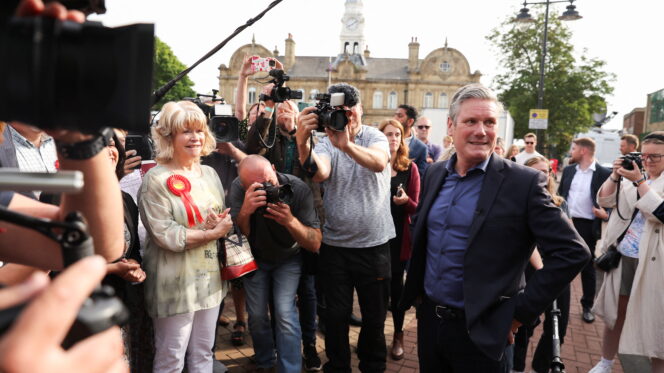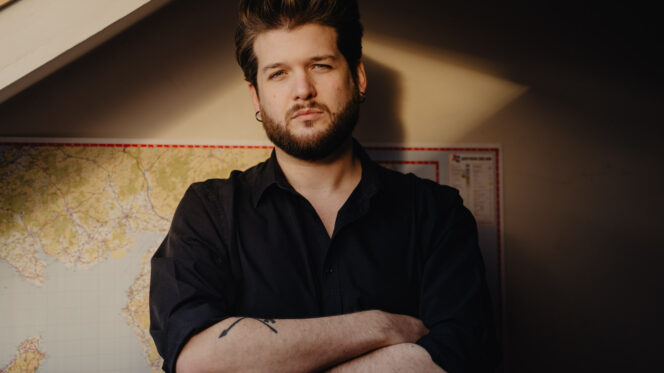Who Cares About Rochdale?

Labour’s disowning of Azhar Ali, its parliamentary candidate in the forthcoming Rochdale byelection, over anti-Israel comments has had the Westminster press in rapture. The story has pushed leftwing challenger George Galloway to the front of the bookies’ polls, and refocused minds on Labour’s position on Israel’s rampant assault on Gaza.
It is the very scenario Labour had hoped to avoid, and the reason Keir Starmer held out for two days after Ali’s parroting of an online conspiracy theory first came to light. It is not, as some are claiming, merely that the now former Lancashire County Council opposition group leader is on Starmer’s wing of the party – the leadership had been backing journalist Paul Waugh for the candidacy. But it does, at the very least, show that Starmer seems more tolerant of antisemitism when there is political expediency to think about.
Not that Ali is a write-off. According to the broadcaster Michael Crick, Ali most recently tried to spin the narrative of his abandonment into a contest between his strong voice for Palestine and anti-Palestine Starmer. It has been reported that he is now conducting a campaign as an independent via WhatsApp.
The more important factor, however, is that Labour’s withdrawal of support comes after postal ballots have already been finalised. In 2019, nearly one in four votes in Rochdale was cast by post, with 78% of postal ballots being returned, and last week Labour-branded leaflets advocating a vote for Ali landed in letterboxes.
What’s more, despite mobilising around disaffection with Labour over Palestine, Galloway is no shoo-in. He underperformed in the 2021 Batley and Spen byelection. Despite explicitly using the opportunity to take aim at Starmer over his stance on Palestine in the wake of the Al Aqsa attacks during Ramadan that year and his flip-flopping on Kashmir – both important issues in the constituency, which has a large number of Muslim voters – Galloway struggled to mobilise the necessary turnout, securing only half the votes his campaign had hoped for.
It’s possible the same will happen again, despite Galloway again focusing on wards where the proportion of Muslim voters is highest. A major difference is that, compared even with the Al Aqsa crisis in 2021, Israel’s genocidal campaign in Gaza has precipitated a palpable sense of urgency in majority Muslim communities. Still, his win in Bradford West’s 2012 byelection was delivered on the basis of winning across the entire constituency, and at a time when his national profile was higher as a prominent anti-austerity figure.
The emerging tenor of this byelection campaign is something on which disgraced former Rochdale MP Simon Danczuk, now running for Reform UK (formerly the Brexit party), is also trying to capitalise. Having launched his campaign by taking aim at Labour with a “work not woke” slogan, he has pivoted to calling himself the only alternative to Galloway with a new, less catchy motto: “Rochdale not Gaza.”
But Danczuk’s campaign is neither about localism nor appealing to those frustrated that local issues are being supplanted by a debate about foreign policy positions. The way in which Danczuk aims to appeal to the so-called silent majority seems to be on the basis of dog-whistling to an imagined white vote. His campaign has trumpeted the memory of the Rochdale child sexual exploitation ring, a minority of whose members were convicted in 2012, placing his record on “making clear that the perpetrators were of Pakistani/Kashmiri origin […] and that the abusers used their ethnic and religious culture to justify their rape and torture” at the top of his achievements.
The painful legacy of the grooming scandal – for which Rochdale has become a by-word in the minds of many of those who live outside of the north west and south Pennines – is relevant because it speaks to the poverty that has marred the town and the class prejudice that has been directed at its people by the state. According to Greater Manchester Poverty Action’s Poverty Monitor report, in 2022, ten years on from the convictions, 28% of children in Rochdale were still living in poverty. This was highest in Milkstone and Deeplish ward, where 50% of children live in poverty, and where Galloway’s campaign has been strong.
It’s not clear which, if any, of the candidates currently care about this. Which is to say: it’s not clear they care about Rochdale itself. Instead, depending on who you listen to, the byelection campaign has become about sticking two fingers up to Starmer, Galloway, or those people – largely Muslim – “banging on” about Palestine.
Of course, Palestine is a Rochdale issue for some voters. Aside from politics, many people will also have family links there, as in many constituencies across the north and Britain more widely. But no one really expects Galloway to set foot in Rochdale again if he loses. Rochdale itself is not a Palestine issue. I would like to think that this prediction is deeply ungenerous – after all, Galloway did return to Batley and Spen to support Workers party candidates in the 2022 local elections – but who’s to say.
More importantly, whether Labour loses to Galloway or Ali wins by happenstance, it won’t be the people of Rochdale the party seeks to win back at the next general election. It won’t be the parents of the 28%, or about righting the wrongs of the last 20 years. Meanwhile on Palestine, Labour knows the damage is done. In Rochdale and elsewhere, Starmer will hope to figure out what bones Labour can throw to the mythical Muslim vote to peel away enough of them that he can forget about the rest.
Commentators love to remind us that byelections aren’t reliable sources of information. That might be true if what you care to divine is electoral calculus and voter intention in a general election. But if your interest is not what voters can do for political parties but instead what can be done for voters, byelections like the one we’re now witnessing show very clearly the way in which politicians will rake over deprived towns like Rochdale as if all they could ever be is a means to an end.
This article was updated on 23 February 2024 to clarify that postal ballots had not yet been issued to voters prior to Labour’s withdrawal of support to Ali.
Craig Gent is Novara Media’s north of England editor and the author of Cyberboss (2024, Verso Books).


